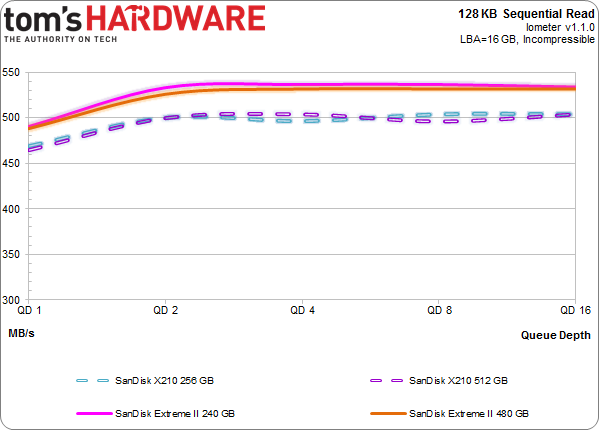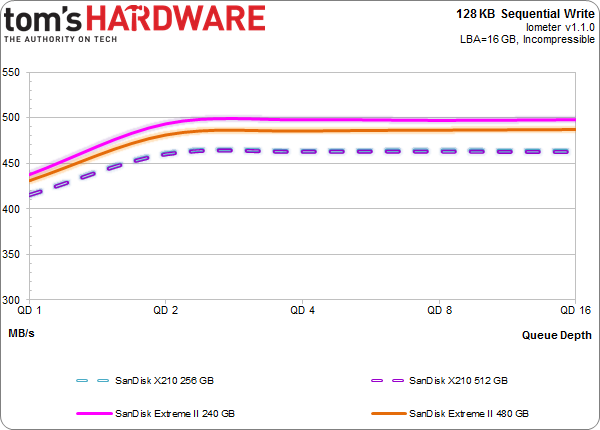SanDisk X210 256 And 512 GB: Enthusiast Speed; OEM Reliability
SanDisk's X210 SSD is both an OEM drive for major vendors and an aftermarket product for the enthusiast world. Having passed a gauntlet of validation tests, can it break into the consumer space as a true alternative to the quickest power user products?
Results: 128 KB Sequential Performance
Fantastic sequential read and write performance is a trademark of modern SSDs. To measure it, we use incompressible data over a 16 GB LBA space and then test at queue depths from one to 16. We're reporting these numbers in binary (where 1 KB equals 1024) instead of decimal (where 1 KB is 1000 bytes). When necessary, we're also limiting the scale of the chart to enhance readability.
128 KB Sequential Read
Sporting the same controller and flash complement as SanDisk's Extreme II, you'd think that the OEM X210 would post identical numbers. That's not the case, as it turns out. There is a significant difference in our sequential read workload; the consumer-oriented Extreme outpaces the more conservative X210.
Then again, the delta isn't really worth fretting over; anything over 500 MB/s is just gravy.
128 KB Sequential Write
The same goes for writes. The Extreme II's exceptional write performance eclipses the X210. Again, though, we're not worried. If the OEM-oriented drive is slightly slower, we know there's probably a good reason.
Here's a break-down of the maximum observed 128 KB sequential read and write performance with Iometer:
Get Tom's Hardware's best news and in-depth reviews, straight to your inbox.
The 256 and 512 GB X210s shuffle into the middle of the pack with respectable results, though they still take a back seat to SanDisk's more enthusiast-oriented Extreme II. The company's other OEM-styled offering, the A110, leverages a more modern PCIe interface to secure its first-place finish. Throwing off the shackles of 6 Gb/s SATA is certainly beneficial.
Current page: Results: 128 KB Sequential Performance
Prev Page Test Setup And Benchmarks Next Page Results: 4 KB Random Performance-
TeraMedia Is the warranty 5 years or 3? Last page says one thing, an early page says another.Decent review, decent drives. Has THG considered doing something similar to what the car mags do, where they take certain products and use them for a year? It would be great to capture that kind of longer-term info on certain types of products, especially the kind that wear out (ODDs, fans, cases, HDDs, SSDs, etc.).Reply -
Quarkzquarkz What about Samsung SSD pro 512GB? I bought 2 of these and on that chart is only 128 and 256GBReply -
vmem @vertexxthere isn't anything particularly exciting about Kaveri going by Anand's review. I shall want for the A10 version with higher clocksReply -
smeezekitty MLC with 5k write endurance!And affordable and fast?We may very well have a new solid contender in the SSD worldReply -
RedJaron I agree with Chris. I don't need the fastest bench speeds in a SSD. Most models now are very fast and the user won't see the performance difference. I want reliability and longevity. Looks like this is a smart choice for any new builder.Reply -
jake_westmorley Can we PLEASE have some normal graphs for once? The graph on page 5 in stupid 3D is so bad it's comical. The "perspective" effect completely screws with the data. This has zero added value and is almost as bad as still using clipart.Reply -
Duff165 I find it hard to believe that the author has had "literally dozens of SSd's die" on him over the years. This would suggest that many systems have contributed to the demise of many of the SSD's being used, which seems somewhat outlandish. Just the cost factor involved in the purchase of so many SSD's and then having over a dozen of them fail, supposedly also from various companies, since if they were all from the same company it would not really be conducive to good sales. One, or maybe two I could live with, but dozens? No.Reply


